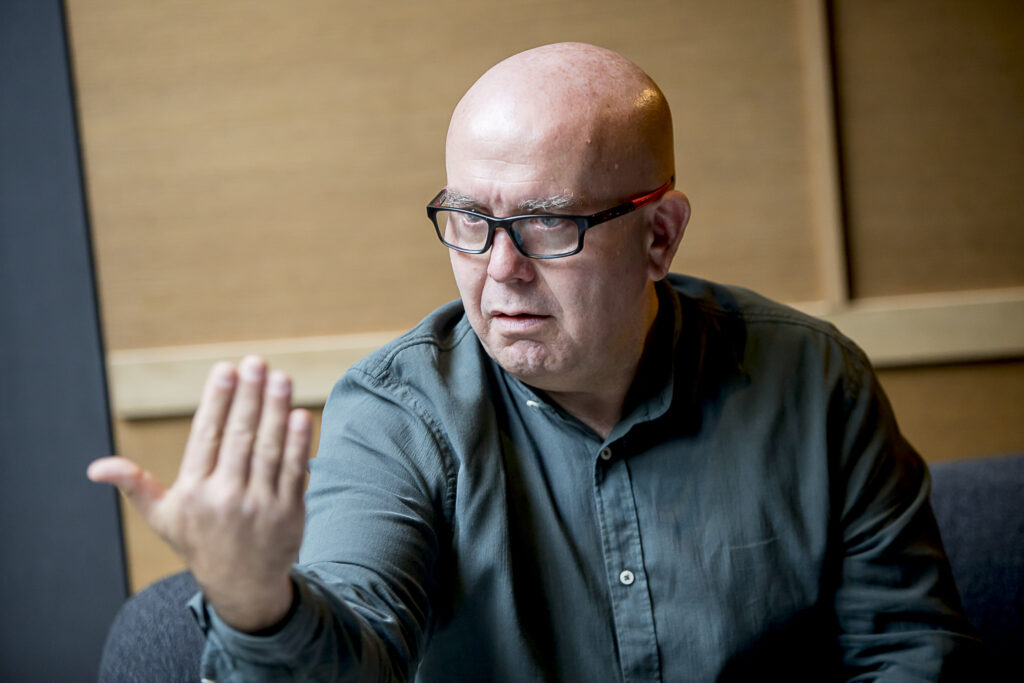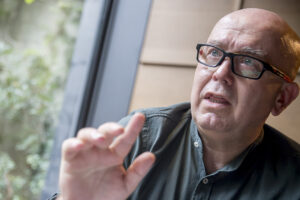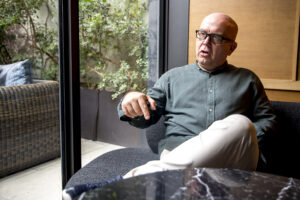06.10.2021 - 10:06
|
Actualització: 06.10.2021 - 12:06
Pablo Llarena is the Spanish judge who has been pursuing the politicians in exile for four years. Since the end of October 2017, lawyer Gonzalo Boye has been engaged in an international legal strategy which the Spanish Supreme Court has attempted to beat on numerous occasions. With the confidence of someone who refuses to back down, Boye outlined his tactics in the interview, beginning with Puigdemont’s appearance before the Sassari Court of Appeal last Monday, with an eye at all times on the EU Court of Justice. Above all, Boye stresses the serious consequences that this obsession with Puigdemont has had and will continue to have for Spain.
—Will Monday’s hearing be anything more than a mere formality?
—It won’t be just for show; very important technical issues will be discussed.
—Such as?
—Immunity. And the systematic non-compliance with the resolutions of both the European Parliament and the European General Court (EGC).
—To do with key issues regarding the crimes for which Spain wants to extradite him?
—We won’t go that far, because we can’t get past the question of immunity.
—What did you think when you found out president Puigdemont been arrested?
—At the time there was no time to think, only to act. I set in motion the protocol I’ve designed for just such eventualities, I got in touch with the key players, I gathered as much information as I could, and I got down to work.
—You mean you’d foreseen that something like this could happen?
—The other day I was asked what strategy we’d be using going ahead. We’ve never changed our strategy; it was laid out in black and white in a document written in October 2017. We’ve never trusted what the Kingdom of Spain told the EGC, that the European Arrest Warrants (EAW) had been suspended. We had a feeling that it wasn’t the case, which is why we’d been trying for several months to verify the status of the president and the others in exile. We’d been prevented from doing so up until this week, in the case of Puigdemont, and until next week for the others. We told the EGC that we believed if what Spain had said was true, then no interim measures would be needed. But we didn’t believe it. Which is why the Vice President of the court, in the resolution of 30 July, stated that if such a situation arose, we would ask for them again. Faced with this situation it was pretty clear what we had to do.
—Were any Spanish police officers present when Puigdemont was arrested?
—As an act of transparency, for the sake of our mental health and also for the sake of democracy, it’d be extremely interesting to see the passenger manifest for that flight.
—Do you suspect that there were Spanish police officers on the plane?
—Let them show us the manifest. Whenever I make a mistake, I apologise. They can prove me wrong by releasing the list of passengers.
—If the arrest turns out to have been illegal…
—The problem is that from the point of view of an Italian police officer, the system flags up the person they have in front of them. To what extent can they make their own decisions? The system tells them that an arrest warrant has been issued for the person standing in front of them. They’re just doing their duty.
—But the same thing could have happened in other countries where Puigdemont has passed through. But it hasn’t. In Italy they were prepared, it wasn’t improvised.
—There was some sort of preparation, without a doubt, but not by the border police at the Alghero airport, but there was preparation. The president’s unique status throws some light on this subject.
—How do you mean?
—That despite having immunity as an MEP, the Spanish Supreme Court maintained contacts with certain police officers and continued with its attempts to violate his immunity and attempts to arrest him in several places.
—Before the appeal?
—Before the appeal and after being elected MEP, the Supreme Court tried to stop him on several occasions.
—And after the appeal?
—Then, too.
—In which countries has the Spanish Supreme Court tried to have Puigdemont arrested?
—Austria, Switzerland, France, Germany… It’s been four years and they haven’t stopped.
—Do you think this might lead to the EGC speeding up its decision-making process with regard to the EAWs and immunity?
—It won’t speed things up, but it will consolidate our position. Since it’s obvious we’ve never lied. And what’s more: we have proof that this is a special case for Spain, a political case. And now that we have this proof, we’ll make it public.
—With all the information you have now, who do you think was responsible for Puigdemont’s arrest in Alghero?
—The person who is ultimately responsible for his arrest is the individual who agreed to it and who hasn’t suspended it: Justice Llarena. However, there are a number of other officials, such as individuals in the Spanish police, who have clearly played a part. And I think that the state prosecutor has done their bidding in this case. She’s been encouraged to say things which aren’t true.
—You mean they made her lie to the EGC?
—Yes.
—Lying about the State’s position?
—And as to the facts behind the case. There is a problem regarding the lack of veracity of the facts. The fact is that the warrants were still in force, although according to the court’s statute the procedure should have been suspended. If someone doesn’t understand the truth behind the facts, they might reach a very different legal conclusion. If I say that Peter is alive, it’s hardly likely I can be convicted of murder. But I’m hiding the truth, because in fact Peter is dead. That’s why we didn’t win the case, even though we were in the right, because one of the parties, with all the credibility in the world, said something that was not true. Besides, their position was logical in accordance with the law.
—You don’t think that this key information, in other words, that the EAWs were still active, was deliberately not passed on to the state prosecutor?
—It’s highly likely they didn’t tell her.
—But she ought to have known.
—She represents Spain and presumably in the communications she will have had with the Supreme Court it was an important piece of information that needed to be passed on: “Sonsoles, the EAWs haven’t been suspended.” I know the lawyer who represents the kingdom of Spain and it seems to me that if she had known the information, she wouldn’t have brought the case. But she did. I give her the benefit of the doubt as an upstanding member of the profession, but it’s all part of Spain’s strategy, for sure.
—Did the Spanish government have a part to play, aside from the Supreme Court? Surely they must’ve been aware of the police’s role.
—Well, if the Spanish government knew what was going on, then they took part in this mess. And if they didn’t know, then it’s almost worse, as it means we live in a country [Spain] where the government doesn’t know what its police are doing. And that’s very dangerous. Spain has put itself in a situation I wouldn’t want to be in, one of an absolute loss of credibility with regard to the statements it makes to the highest international courts.
—You’ve already asked for interim measures.
—In doing so, it’s not because we’re afraid of the Italian justice system: it’s because we are worried about Spanish injustice. We wouldn’t ask for measures that make it look like we don’t trust the Italian justice system. But obviously we have to secure a position which brings peace of mind to the defendants beyond the 4 October.
—Could new measures be used to further clarify the situation in order to prevent Puigdemont from being detained again?
—Of course. The EGC will rule on the extent of immunity in all twenty-seven EU states, not just twenty-six. And it’s a question that people will have to examine since, in their desperate attempts to put Puigdemont behind bars, they didn’t stop to think about the consequences of their actions. This haste, not knowing how to act, this disloyalty has led us to a situation where we have made a lot of progress.
—And now the European Parliament will have to get involved again.
—The European Parliament will have to defend a situation that is already about much more than Puigdemont, Comín and Ponsatí, or Catalan independence, and deal with the rights of all MEPs. Because if a judge in a member state can challenge decisions and procedures that are followed in the EGC, what guarantee does any MEP have that they won’t be arrested at any time?
—Will you present a request for Puigdemont’s immunity to be protected by the European Parliament?
—At the moment we will be working in the EU General Court. We haven’t reached that stage yet because we have the hearing on the 4th and the question of the EGC, plus the personal situation of the exiles …
—Do you think this incident will hasten Puigdemont’s return to Catalonia?
—The president will return when our work is done. We don’t yet know if our work will be sped up as a result of the current case. It might be. One thing is clear: we’re paying for this with blood, sweat and tears. The amount of effort is incredible, and we won’t pass up any opportunity.
—Until recently, you wouldn’t have advised Puigdemont to return from a legal point of view. And now?
—When I believe that the risk is legally acceptable, I’ll be the one to come back with the Catalan exiles. They will have to weigh up when it is politically expedient. But they won’t come back to be arrested, locked up in a jail and subjected to an unfair trial. They have undergone a different kind of struggle. When there is a legally acceptable risk, they will have to take it at one time or another, and the decision will be theirs alone.
—Why do you think they chose Italy?
—Because they probably don’t speak Italian and haven’t read Italian law. The 2021 reform of the Italian European Arrest Warrant Law makes our position even stronger, which leads us to believe that they made a bad choice. They also chose Germany and they chose very badly. They didn’t learn from it. When one is a judicial Flat Earther, one is unable to see the curvature of other legal systems. And Europe has a number of situations which are beyond them. The other day I read an article which I thought was truly shocking. It said that the problem is one of contacts. In other words, they want to send [Spanish] judges who can liaise with and have better relations with Italian judges and thereby solve this problem. The article even mentioned some names. What are they on about? Are they suggesting that the Italian judges will change their minds because they’ll be influenced by Spain’s? It’s extremely serious. We’ve had the article translated and we’ll bring it with us on Monday. They’ve learnt nothing in four years. The problem isn’t one of contacts. I don’t know any Italian judges, and I didn’t know any German judges either, but I do know how these legal systems work: ultimately, they work on the basis of respect for EU law, which is precisely what Spain lacks. The Spanish justice system hasn’t been so discredited since the Franco era. And putting it right won’t be easy.
—When the Spanish Supreme Court behaves in this way, you say that it strengthens your position in Luxembourg. But what effective mechanisms are there to make a state pay for a flagrant breach of European law?
—Our greatest ally in defending those in exile have always been Justice Pablo Llarena and the Spanish Supreme Court. Because they strengthen all of our arguments. But aside from being their lawyer, as a citizen, I think we’re dragging Spain towards a situation of non-compliance with European regulations, and in the end the EU will have to call for sanctions against Spain. The mechanisms exist.
—As in the case of Poland?
—Yes. Just read one of the articles in this Sunday’s Repubblica, which ends with: the EU can’t afford this. The mechanism of the EAW was created as part of the fight against organized crime and terrorism, and it’s being perverted in order to persecute a person for their actions and their political ideas. Sooner or later this will affect the credibility of the system, and the interests of the twenty-seven member states, including Spain.
—But these instruments depend, to a large extent, on the Commission to activate them, and up to now it’s been applying a double standard with regard to Spain, Poland and Hungary.
—At present the EGC and the CJEU have mechanisms to force the Commission to set in motion these kinds of procedures. They’re not quite ready yet, though I can understand that that people in Catalonia think otherwise, but if they don’t change their ways, it will end up happening. The EGC and the CJEU are like my cat: he is very affectionate until you step on his tail. If you do, it turns into a beast.





